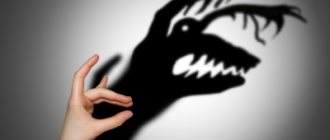Pain and fear are accepted by the human body as an abnormal condition. The feeling of danger that arises in this case triggers an innate mechanism - the instinct of self-preservation. This is one of the basic innate forms of behavior, forcing the body to unconsciously seek means of protection and salvation.
Markers of the instinct of self-preservation
Definition
What is the human self-preservation instinct? This is the instinct that allows people to survive. When a car appears on the road, a person will turn away from the car’s trajectory, and if a hurricane begins, a sane individual will hide in the nearest permanent building. Some people say that everything needs to be learned, and this is true. Nature does not always endow people with the same qualities and lay down the same abilities. Some people have a well-developed instinct of self-preservation, while others have to work on its development. How often can a person’s unique ability to preserve his own life come in handy? Daily. Few people think about the fact that hunger is a signal from the body that reminds us that it is time to eat. If it had not been there, the person could have died. The same goes for sleep. A person must sleep, otherwise his body will not be able to tolerate daily physical activity. How else can a defensive reaction aimed at survival manifest itself?
Let him do whatever he wants inside you - an effective technique of non-resistance
Fear is illusory.
The main points and essence of this technique:
- If you look at him and let him eat whatever he eats without judgment, you will see that he does not affect you. Then you begin to see the helplessness, stupidity, limitation and uselessness of fear. Fear is simply a fake that is not worth attention or trust.
- Tell fear : “ Do whatever you want .” Allow it to manifest itself as it pleases within you.
- Don't run away from him and look at him.
- Don't try to make fear go away ! Let it reveal itself in all its beauty. It may be an unpleasant process, but it is effective.
- Don't get involved in it and let it be . Then he will not be able to control you, and you will be able to overcome your fears.
During such a process, you realize that fear cannot do anything other than create an emotion or sensation.
After all, fear is a ghost without a reason or basis .
Look straight into fear.
After all, it’s just not a real emotion, it can’t touch you.
By allowing fear to be, you realize that it is like a ghost. There is no real danger. There is only an emotion that appears. And if you don’t run away from it, it appears, grows and then disappears. The more often you DO NOT run away from fear, the faster the fear will disappear.
Without resisting what comes and goes, you close your questions about how to get rid of obsessive thoughts and fears.
Manifestation of instinct
What do you do to survive? Nothing? It is not true. The instinct of self-preservation in humans is an innate quality, the manifestations of which few people think about.
- Satisfying hunger. In order not to die, a person must eat daily. What would happen to a person if there were no hunger? Some individuals who have memory problems might die. And it is simply impossible to forget about what you really want.
- Warm clothes. A person protects his body from the cold before going out into the cold. To avoid sunburn, people use sunscreen. By protecting his body, a person thereby saves his life.
- Treatment. You can die from a common cold. For many centuries, people have improved their knowledge of medicine in order to treat their fellow citizens and themselves. If a person gets sick, he will not lie down and moan; the instinct of self-preservation will force the individual to make an appointment with a doctor.
- Armament. If war breaks out, all people will take up arms. The need for peace and tranquility forces a person to defend his rights and not give his life without a fight.
What does a person have?
Instead of instincts, a person has reflexes, vital (life) needs and numerous social attitudes
, conscious or, more often, unconscious (in other words, decisions imposed by society, which we sometimes accept as supposedly our own choice).
Among the vital needs,
we note, for example, the need for safety, food, avoidance of pain, etc.
Reflexes
, as many remember, can be conditioned and unconditioned.
In the context of instincts, unconditioned reflexes are of more interest. The most common example of an unconditioned reflex is withdrawing your hand from a hot kettle.
You can also remember the sucking reflex of a baby. These are truly “innate” actions, performed automatically and often without conscious control. We have quite a lot of such reflexes, including sneezing, coughing, etc. Reflex and instinct have an important difference
. A reflex is a relatively simple action, a response to a specific stimulus. Instinct is a program of action, often pursuing a specific goal (reproduction, search or creation of shelter, etc.).
The difference between human and animal instinct
How do people differ from their smaller brothers? What distinguishes humans from animals is the instinct of self-preservation. But animals, birds, and even insects have this instinct. What's the difference then? There are two types of self-preservation instinct.
- Unconscious. When a fire starts, a person will not think about what he needs to take. He will quickly run to where there is no fire. The hare and the fox will do the same. Animals in the forest can not only flee from fire, they will instinctively run to water. A person will do the same. After a terrible natural disaster, not all people can explain why they were able to survive. Many say they don't remember where they ran or what they did.
- Deliberate. What distinguishes humans from animals is the instinct of self-preservation of this particular species. In a critical situation, people can remember that it would be nice to save their loved ones, documents and grab valuables. A person can act quickly and accurately in the event of an accident, rescuing the wounded and pulling out the injured.
Instinct to preserve personal freedom
Those who fight to preserve personal freedom exemplify the instinct for freedom. From the cradle, such children protest when they are swaddled, and any type of restriction of freedom also causes rejection, which grows with the baby. The dominant qualities of such people are considered to be the desire for independence, stubbornness, tolerance for pain, and a predisposition to risk. They do not tolerate routine and bureaucracy. Due to the fact that such people have a suppressed instinct for procreation and self-preservation, they very often leave their families. They tend to preserve their freedom, interests and individuality. Such people cannot be too limited in their actions; they do not like to be subordinated.
Lack of instinct
The instinct of self-preservation in humans is an innate quality. But for some individuals it may be absent. Is this bad? People who are not afraid of death are very dangerous. They can, without a twinge of conscience, take the lives of not only themselves, but also those around them. How is it that nature gives some people the instinct of self-preservation, but not others? All people have an instinct, it’s just that some people have it weak, while others have it strong. Society needs risk-taking citizens. People who work as firefighters, police officers and doctors help those who need it survive. Therefore, over time, people become more and more fearless. It is passed on genetically. And if earlier people used instinct for the benefit of society, today they use it to their detriment. If a person does not have the instinct of self-preservation, he may commit suicide or become a bomber. Such people are dangerous both to themselves and to society.
Is being an explorer a result of a person’s upbringing or genetics?
The investigative type can also be called curious. In this type, the instinct of exploration is considered dominant. Since childhood, these are “why people” who have a high level of curiosity, and they show a desire to get to the bottom of everything in everything. Children of this type should always receive deep and confirmed answers to their questions. They read a lot and love to experiment. Often these are creative people, regardless of what they are interested in. Therefore, a researcher is more likely the result of a person’s inclinations than of upbringing.
Violation of instinct
Have you ever met a person who is terrified of something? What is a person's main fear? Fear of death. What distinguishes humans from animals is the instinct of self-preservation. The use of this instinct leads some to insanity and phobias. People are afraid for their own lives, they see threats everywhere, so they install several locks and CCTV cameras at home. Some people worry that the elevator car may break and fall, so they try to avoid using lifting machines. Panic attacks can haunt a person from year to year. This is not a normal reaction. An aggravated defensive reaction indicates psychological problems that the individual has. They must be fought, otherwise they can drive a normal person crazy. The situation gets worse with age, so do not delay visiting a specialist if you have several of the symptoms listed above.
To combat fear and anxiety, you need to understand not the consequence, but the cause of its occurrence.
Otherwise they will never leave throughout their lives.
Subconsciously, people themselves avoid fighting fear.
People struggle not with the cause - fear, but with the consequences of fear - inaction.
It’s easier for people this way, because fighting inaction is much more pleasant than fighting fear.
So people occupy themselves with all sorts of activities, the effectiveness of which is no higher than simple picking their nose.
It doesn't bring results. Questions about how to remove fear and embarrassment and be confident in yourself remain unresolved.
- A person who struggles with fear does what is most effective, regardless of whether he is afraid to do it or not. As a result, a person quickly achieves success, becomes more confident and stronger.
- A person who struggles with inaction avoids everything that he is afraid of and occupies himself not with what is effective, but with what is pleasant to do. Such people spend their whole lives on various nonsense, because their goal is simply to be busy . And they get what they want - employment. They get busyness instead of results.
All the people around are trying to be busy and are not even looking for an effective method to overcome their fears and phobias.
There are no results, because the chosen activity is chosen by people only to avoid their fear, and not to achieve results.
Everyone struggles with inaction , not fear.
Because of this, a person experiences worries all his life and worries about how to get rid of depression at home.
Engage in self-education and self-development!
- Self-education teaches us to overcome fears. It teaches us to do what is effective. Thanks to self-development, we are no longer worried about how to deal with fear and anxiety.
- The fight against inaction teaches us to just be busy. Endless searches for employment and blind actions bypass fears.
Suppression of instinct
People love to tickle their nerves. Today this way of relaxation is very popular. Do you think a person has an instinct of self-preservation if he wants to jump with a parachute or climb a cliff without insurance? There is, but the individual suppresses it by force of will. If the instinct of self-preservation is normal, then it can be silenced for a while. For example, a person can read reviews of those who have successfully jumped with a parachute. Comments that say that these 3-5 seconds of free flight were the best in life really stir the blood. A person wants to get his dose of adrenaline, so he gets on the plane with pleasure.
But suppressing the instinct of self-preservation does not always play into people’s hands. If a person falls into depression and cannot get out of it, he may decide to commit suicide. Causing pain to yourself doesn't seem like such a big deal compared to depression, which hasn't subsided for several years. Due to the fact that instinct can be relegated to the background, people decide to get tattoos or deliberately mutilate their body.
Criticism
K. Lorenz expressed skepticism about the existence of the instinct of self-preservation as an independent biological impulse:
The activity of an organism, which can be named by its function - nutrition, reproduction, or even self-preservation - is, of course, never the result of only one single cause or one single impulse. Therefore, the value of such concepts as the “instinct of reproduction” or the “instinct of self-preservation” is as insignificant as the value of the concept of some special “automotive force”, which I could just as rightly introduce to explain the fact that my old the good car still drives... Anyone who is familiar with pathological violations of innate mechanisms of behavior - we call these mechanisms instincts - will never think that animals, and even people, are guided by some guiding factors that are understandable only from the point of view of the final result , but are not amenable to causal explanation and do not need it. Behavior that is uniform in terms of function - for example, feeding or reproduction - is always due to a very complex interaction of many physiological causes.
> See also
- Attraction to life
- Suicide
- Apoptosis
Childish instinct
With rare exceptions, all children are born with the same instinct of self-preservation. So why does the situation change with age? Excessive care or a dysfunctional family can play a role in the development of the child’s psyche. In the first case, the child will not be afraid of absolutely anything, but in the second, he will grow up too downtrodden. But this will become obvious only later. It was described above how the instinct of self-preservation manifests itself in an adult, but in children and infants the reaction to the world around them is slightly different. They react to everything by screaming. What could be the reasons for continuous sobbing?
- Losing my mother. If the child does not see his mother, he begins to cry. Mom is the person without whom the baby cannot exist.
- Strangers. A crowd of unfamiliar people is a potential danger. Therefore, a child may cry so that his mother will take him away from a strange gathering for him.
- Loud sounds. Music, noise or television disturbs the child's sleep. The instinct of self-preservation tells the baby that loud noises are dangerous.
- Satisfying natural needs. If the baby wants to eat or drink, he will call for adults. Without this, he will not survive, so at the slightest need he raises a strong cry.
What is this?
A long time ago, in Ancient Greece, thinkers and simply smart men noticed that it is human nature to react and behave in the same way in unsafe conditions. The instincts themselves are in the hemocode, and they consist of reflexes, which in turn are:
- Conditional - that is, those that a person acquired during his life. The simplest example is when you turn on the light as soon as you enter the room. You were not born with this knowledge and habit, but acquired it as you grew older. And now you don’t even notice how your hand reaches for the switch.
- Unconditional, respectively, those that we received at birth. It’s rare that someone doesn’t withdraw their hand after touching a hot frying pan or iron, right? This is an unconditioned reflex.
Instincts can be influenced by religion, law, norms and rules of behavior, education or lack thereof. For example, in a family where parents abuse overprotection, controlling every step of the child, then what kind of independence can we talk about? He won’t really understand in which situations he should be careful, and in which, on the contrary, he should show up.
Such stories most often have two versions of events.
First: a child, growing up, remains to live with his parents, since in order to create a family, you need at least a little independence and the ability to rely on yourself.
Second: he tries in every possible way to escape, becomes uncontrollable and aggressive towards those who care for him. The stories of the second option usually end more successfully.
To make it clearer how instincts can be influenced, let’s first look at what they are.
What can instinct be confused with?
A person can sometimes have a poor understanding of his feelings. Violation of the self-preservation instinct helps to become even more confused in the situation. Therefore, people do not always understand what truly poses a danger to them.
- Stupidity. A person may suffer due to overestimation of his own strength or due to lack of information. For example, not knowing that a shark can be found in the open sea, an individual will swim without fear. A predator can take a person by surprise, and the instinct of self-preservation can no longer help. Overestimating one's own strengths may involve conquering a steep mountain. An unprepared person can go to storm the mountains, and halfway through the journey realize that there is no more strength. There will be little choice; if you don’t have enough strength to climb, you’ll have to fall.
- Fear. A person can panic over absolutely nothing. For example, a girl will be afraid to walk around the city center at night only because her grandmother told her that after the war it was impossible to go out at night.
Understand that there is nothing valuable in life that you can cling to.
There is really nothing in life that you can truly cling to.
If you dig deep, then for people, in fact, the most valuable thing is simply sensations (pleasures, good emotions).
But they don't create much value.
To get rid of constant fear forever, you need to be a free person inside .
People do everything in the world for the sake of sensations, good emotions, tactile pleasures.
The entire evolution of man is a race for emotions and sensations.
People are driven by emotions, they want to experience them.
Hence they are afraid of losing them, people cling and depend on sensations and emotions.
There is a fear of losing a partner and love addiction.
Because of attachment and clinging, you begin to worry more and more about how to get rid of the obsessive fear of losing your loved one.
How to develop the instinct of self-preservation
If a child had a quiet childhood, and his mother did not give him the opportunity to climb trees or run through puddles, then the teenager may grow up “greenhouse”. He will know about the dangers that await him only by hearsay. The instinct of self-preservation is a basic instinct, but sometimes you have to develop it through your own efforts. How can this be done? Start playing sports, but not extreme ones, but something like martial arts. Thanks to sports, excess energy will come out, but your health will remain. Try to find a safe hobby. It could be music, art or dance. For a person with excess energy and a love of adrenaline, public speaking and communication with high-ranking persons can be a salvation.
Laugh in his face, he should only have one role in your life - entertainment
Laugh from the mere feeling of fear.
This laughter destroys any of its manifestations .
This is the only weapon. This is how you can overcome anxiety and fear with just laughter.
You cannot fight it, solve it, or negotiate with it.
You can just see that it's just fake .
Fear is a reflex that develops on its own.
This reflex bypasses the cerebral cortex.
Persuasion and reasoning have no effect on him.
Fear does not go through the cerebral cortex and does not respond to persuasion.
If you feel afraid or afraid of something, laugh and smile at it, and you can get rid of your inner fear.
It makes your life more interesting and exciting. This is how wise fighters in the ring close their questions about how to get rid of the fear of fighting and all phobias.
How to suppress the instinct of self-preservation
It is difficult to say who has an easier life: a person who loves risk, or a person who is terrified of danger. It’s probably hard for both one and the other. But how can you find the fine line and overcome your fear? You should take up extreme sports. Try to master a motorcycle or ride a racing car, skydive or paraglide. There is no need to completely eradicate fear; you should learn to manage your feelings and, if necessary, push the instinct of self-preservation aside. You can tickle your nerves from time to time by watching horror films or reading horror stories. But don’t get carried away, remember that the line between two extremes is very thin.
Know that fear has no power over you, it is simply experienced in the body
With this kind of thinking, you understand that fear will be experienced in the body and this is the maximum that will happen to you !
Gradually you don't pay attention to him.
For you, this is just another emotion that appears and disappears .
There is nothing at the root of fear. There is no foundation on which it rests.
Watch the following useful video on how to cope with the fear of death, the future, failure and all sorts of unnecessary thoughts.
Is it possible to solve problems on your own?
One example of the human self-preservation instinct is the fear of heights. A person cannot look down from the 100th floor without fear. And that's quite normal. But there are people who cannot walk across the bridge, which is suspended 10 meters above the river. Such fear is stupid and unnatural. Fear that does not interfere with your life and protects you from committing various stupid things is the instinct of self-preservation. But what if it is developed too strongly or too weakly? If you have been trying to improve the situation for several years, but all your attempts are unsuccessful, then consult a doctor. A specialist will be able to help you and save you from panic attacks and other nonsense that your parents or teachers have put into your head.
Types of instincts according to Garbuzov, description
According to the concept of this professor, psychoneurologist and philosopher, there are seven basic instincts. These include: the instinct of procreation, self-preservation, freedom, exploration, preservation of dignity, altruistic and dominance.
There are three dyads into which instincts are grouped. For example, dyad “A” is considered basic; it ensures the physical survival of the individual and the species. This dyad includes two instincts: self-preservation and procreation. But dyad “B”, consisting of the instinct of research and freedom, ensures the primary socialization of a person. The last, third, dyad “B”, which includes the instinct of dominance and preservation of dignity, ensures self-affirmation and self-preservation of a person in the psychosocial aspect. Taken together, all three dyads guarantee a person’s adaptation in real life.
Do your own self-analysis in writing.
Self-analysis allows you to clearly analyze the problem and write your own answers to it.
Grab a pen and paper and do some written self-reflection.
The benefit is that this way you can independently remove fears from a person and get answers yourself without the need to turn to someone for help.
For example , ask yourself these questions:
- What is bothering me now, and what is the cause and source of the problem?
- What makes me feel this way?
- Is it really real or is it just a feeling?
Everyone will have their own unique answers to questions about how to get rid of fears and phobias.
Everyone can solve the problem themselves.
Create new reference experiences, destroy old limiting beliefs
When you face fear and do something that was previously scary, your brain creates a new reference experience.
The brain understands that there is no fear and there is no reason to be afraid of anything.
This way you gain new insights about how to treat anxiety and fears.
To leave it behind, you have to go through it.
Only by walking through fear will you rewrite and create a new reference experience that will destroy old limiting beliefs.
- If you run away from fear, it will chase you throughout your life. It will wear you down and turn your life into an escape.
- If you follow fear , then at some point you will realize that there is none. After all, he is left behind and nothing can hold you back or stop you.
That's all. Now you know everything about how to overcome the fear of death and live in harmony.











